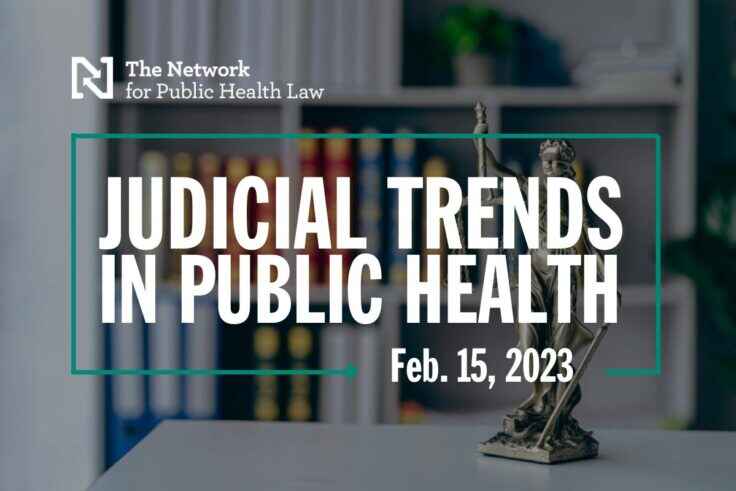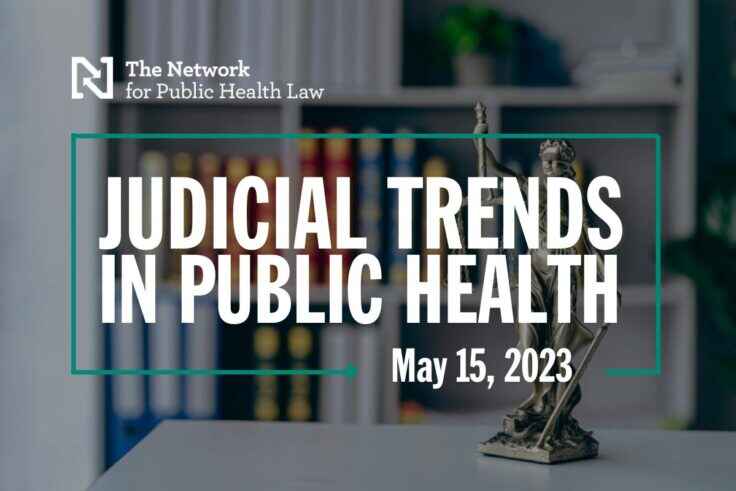|
The Network for Public Health Law monitors key court cases and relevant judicial trends in public health. The Network’s monthly reporter, Judicial Trends in Public Health (JTPH), highlights select, recently-published cases in public health law and policy from the prior 3 months. Case abstracts are organized within 11 key topics (adapted from James G. Hodge, Jr., Public Health Law in a Nutshell, 4th ed. (2021)), including hyperlinks to the full decisions (where available). Contact the Network for more information, questions, or comments. Arizona School Boards Association, Inc. v. Arizona (Ariz. Sup. Ct., Jan. 6, 2022): Plaintiffs challenged four Arizona legislative budget reconciliation bills containing substantive provisions outlawing various COVID-19 intervention measures. Read the abstract here. Western Growers Association v. Occupational Safety and Health Standards Board (Cal. Ct. App., 1st Dist., Dec. 21, 2021): Plaintiff employers alleged the California Occupational Safety and Health Standards Board exceeded its statutory authority in enacting a COVID-19 emergency temporary standard. Read the abstract here. Burcham v. City of Los Angeles (U.S. District Court, C.D. Cal., Jan. 27, 2022): City police department employees brought an action against the city, mayor, police chief, and city administrator alleging that a city ordinance requiring employees to disclose their COVID-19 vaccination status or undergo testing resulted in numerous constitutional violations, including arguments pursuant to the Fourth Amendment, right to privacy, substantive due process, Title VII of the Civil Rights Act, and Fair Employment and Housing Act violations. Read the abstract here. Arc of Iowa v. Reynolds (U.S. Court of Appeals, 8th Cir., Jan. 25, 2022): Plaintiffs sought to block enforcement of an Iowa statute prohibiting mask requirements in schools, alleging that the law placed children with disabilities at heightened risk of injury or death from COVID-19. Read the abstract here. Doe 1, et al., v. Upper St. Clair School Dist., et al. (U.S. Court of Appeals, 3rd Cir., Jan. 23, 2022): The Third Circuit Court of Appeals ordered a school district to temporarily maintain its mask mandate pending allegations from parents of children with disabilities that the mask-optional policy is a violation of the Americans with Disabilities Act (“ADA”) and Section 504 of the Rehabilitation Act of 1973. Read the abstract here. United States v. Bilodeau (U.S. Court of Appeals, 1st Cir., Jan. 26, 2022): The First Circuit affirmed the district court’s judgment denying defendants’ claims that the U.S. Department of Justice (“DOJ”) misappropriated federal funds to prosecute medical marijuana business associates from Maine, who were accused of running an underground operation despite obtaining Maine marijuana business licenses. Read the abstract here. FTC, et al. v. Vyera, et al. (U.S. District Court, S.D.N.Y., Jan. 14, 2022): A federal judge in New York banned former pharmaceutical executive, Martin Shkreli, from participating in the pharmaceutical industry and ordered him to pay $64.6 million for his involvement in dramatically increasing the price of a lifesaving drug and successfully blocking the development of generic versions. Read the abstract here. Ace American Insurance Co., et al., v. Rite Aid Co., et al. (Del. Sup. Ct., Jan. 10, 2022): The Delaware Supreme Court ruled that an insurer is not required to provide coverage and defend Rite Aid in lawsuits brought by governmental entities alleging the pharmacy fueled the opioid epidemic. Read the abstract here. Tonoga, Inc. v. New Hampshire Insurance Co. (N.Y. Ct. App., Jan. 6, 2022): The New York Court of Appeals held that two insurance companies were not obligated to defend their insured, a manufacturer, in lawsuits claiming the manufacturer polluted groundwater with “forever chemicals” because the pollution fell squarely within the policy’s exceptions. Read the abstract here. Armstrong v. Newsom (U.S. Court of Appeals, 9th Cir., Dec. 22, 2021): Plaintiff Armstrong sued California Governor Gavin Newsom, alleging that Governor Newsom’s March 2020 Executive Order ordering Californians to “stay home” to prevent the spread of COVID-19 violated the Due Process Clause of the Fourteenth Amendment. Read the abstract here.
TOPICS: These and other cases are organized on the Network website under the topics below (adapted from chapter titles in Public Health Law in a Nutshell (4th Edition) by James G. Hodge, Jr., Director, Network for Public Health Law—Western Region). Select a topic below to view all cases under that topic. 11. COVID-19 Pandemic: Public Health Emergency Law & Policy Responses
JTPH is a collaboration of the Network’s Western and Eastern Region Offices led by Editor-in Chief, Jennifer Piatt, JD, Deputy Director, Western Region Office. Additional Western Region contributors include James G. Hodge, Jr., JD, LLM, Erica N. White, JD, Rebecca Freed, and Nora Wells. Eastern Region contributors include Kathi Hoke, JD, Morgan Jones, JD, and Brianne Schell, JD, MA.
Legal information or guidance provided in this transmission or website does not constitute legal advice or representation. For legal advice, please consult specific legal counsel in your state. |



